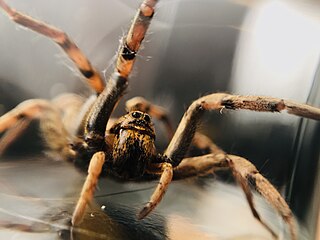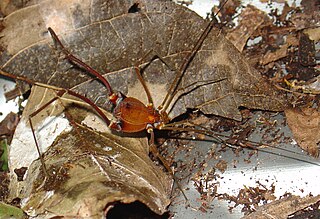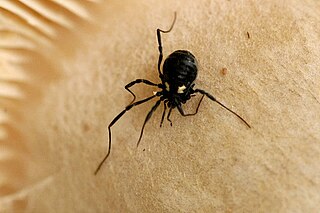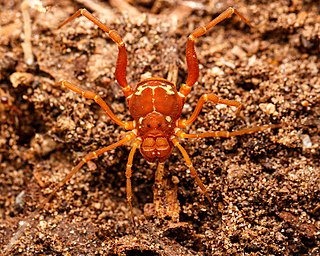
Wolf spiders are members of the family Lycosidae. They are robust and agile hunters with excellent eyesight. They live mostly in solitude, hunt alone, and usually do not spin webs. Some are opportunistic hunters, pouncing upon prey as they find it or chasing it over short distances; others wait for passing prey in or near the mouth of a burrow.

Gonyleptidae is a neotropical family of harvestmen with more than 800 species, the largest in the suborder Laniatores and the second largest of the Opiliones as a whole. The largest known harvestmen are gonyleptids.

Microstigmatidae is a small family of spiders with about 38 described species in eleven genera. They are small ground-dwelling and free-living spiders that make little use of silk.

Gonyleptoidea is the most diverse superfamily of the Grassatores. It includes around 2,500 species distributed in the Neotropics. They are characterized by the simplified male genitalia, with the glans free subapical in the truncus.

Cosmetidae is a family of harvestmen in the suborder Laniatores. With over 700 species, it is one of the largest families in Opiliones. They are endemic of the New World with a Nearctic-Neotropical distribution where a large fraction of the diversity of Opiliones are represented by this single family. Cosmetidae have the northern extent of their range into the USA, where a small number species occur in the southern states. However, the family is especially diverse in Mexico, Central America and northern South America; especially the Andean realms. Their range also extends further south into Argentina and southern Brazil, but they are absent in Chile. Cosmetidae are prevalent in Amazonian region, but only relatively few also occur in Brazilian Atlantic Forest. Several species are also found in the Caribbean.

The Sclerosomatidae are a family of harvestmen with about 1,300 known species. One former subfamily has been recently removed to form a new family, Globipedidae.

The Nemastomatidae are a family of harvestmen with about 170 described species in 16 recent genera. Several fossil species and genera are known.

Epedanidae is a family of the harvestman infraorder Grassatores with about 200 described species. They are the sister group of the Gonyleptoidea.
Agoristenidae are a neotropical harvestman family of the Suborder Laniatores, in the superfamily Gonyleptoidea.

The Cranaidae are a family of neotropical harvestmen within the suborder Laniatores.
Biantidae is a family of the harvestman infraorder Grassatores with about 130 described species.

The Artoriinae are a subfamily of wolf spiders. The monophyly of the subfamily has been confirmed in a molecular phylogenetic study, although the relationships among the subfamilies was shown to be less certain.
Cosmetinae is a subfamily of harvestmen in the family Cosmetidae.

Cynorta is a genus from the subfamily Cynortinae. The genus was first described by Carl Ludwig Koch.
Taito is a genus of harvestmen in the family Cosmetidae. The genus is endemic to the Amazon Basin in Brazil, Colombia, Ecuador and Peru.

Cynortinae is a subfamily of harvestmen in the family Cosmetidae.
Discosomaticinae is a subfamily of harvestmen in the family Cosmetidae.
Flirteinae is a subfamily of harvestmen in the family Cosmetidae.
Metergininae is a subfamily of harvestmen in the family Cosmetidae.
Taitoinae is a subfamily of harvestmen in the family Cosmetidae.










